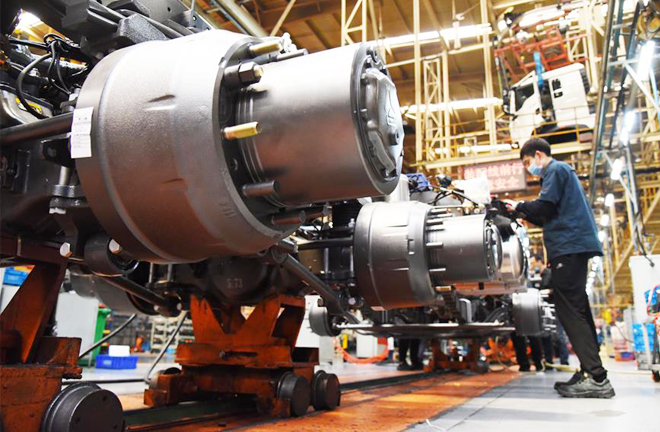Webinar explores COVID-19 economic relief package

An employee works in an assembly line for China National Heavy Duty Truck Group Co., Ltd., in Jinan, capital of east China’s Shandong Province, April 28. This leading Chinese heavy-duty truck maker has made timely adjustments to its supply chain since the outbreak of COVID-19. Photo: Wang Kai/XINHUA
Experts shed light on an economic relief package responding to the COVID-19 pandemic in a recent webinar by China Macroeconomic Forum.
The Chinese economy is still facing some shocks, including the pandemic’s impact on China’ s economic cycle, the pressure of super financial fluctuations on the world economy and finance, and the pandemic’s influence on external demand and the industrial chain, said Liu Yuanchun, vice president of Renmin University of China. To cope with this situation, China must introduce a moderate stimulus plan as well as a package of policies to serve as a fundamental response plan.
When designing a package of macro policies, it is advisable to set a feasible target for the GDP growth rate from the macro level, Liu continued. The first stage should focus on epidemic control, the second stage on epidemic relief, the third stage on economic recovery, and the fourth stage on maintaining growth and reaching goals.
The package of macro-stimulus policies should be based on China’s national conditions, said Zhong Zhengsheng, chief economist of the CEBM Group at Caixin Insight Group. In terms of monetary policy, it is necessary to reduce the cost of debt of commercial banks to further reduce financing demands in the real economy. It is also important to maintain the relative stability of the actual deposit interest rates and of the RMB exchange rates.
Unlike an endogenous shock in the economic system, the pandemic is an external shock with exogenous variables. The impact depends on the duration of the pandemic and the ability of the economic system to resist shock. If external shocks can be quickly controlled, it will not cause substantial harm to the economic system. If the pandemic lasts for a long time, however, it may bring endogenous damage, which will threaten employment, people’s well-being and social functioning, warned Wang Yiming, former vice president of the Development Research Center of the State Council.
As such, Wang said that the package should not only focus on restoring the economic system, but also prioritize protection of enterprises, employment and people’s well-being. It needs to effectively reduce the pandemic’s impact on the domestic economy while addressing the additive effects of the global economic recession.
In Wang’s view, the prerequisite for ensuring employment is to protect enterprises. For example, more measures should be introduced to increase assistance to small and medium-sized enterprises. Wang also proposed prolonging the phased reduction and exemption of social security contributions born by enterprises as well as employment subsidies. To protect people’s well-being is to offer more direct subsidies to those with special difficulties and to create more public welfare jobs.
Li Xunlei, chief economist at Zhongtai Securities, suggested increasing subsidies for citizens given that the pandemic has greatly reduced their income.
The current response to the pandemic requires strengthening risk prevention, Li continued. In particular, the pandemic’s great impact on financial institutions and the financial system across the globe necessitates an effective response to protect China’s capital market.
In real estate, Li said that it is necessary to prevent the abuse of monetary policy, prevent speculation, and prevent large fluctuations in housing prices from affecting investor expectations.
Zhong suggested further strengthening the manufacturing supply chain and maintaining China’s global export channels. While upholding international cooperation under the multilateral framework and providing foreign aid to the best of our ability, we must also take precautions and prevent a new round of trade protectionism from rising.
“Launching a package of macro-policy plans is not simply to maintain growth, but to maintain confidence,” Liu concluded.
edited by JIANG HONG
